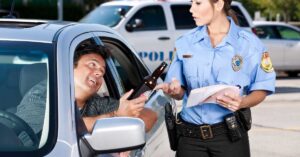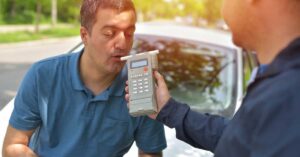If you have been arrested for Driving Under the Influence (DUI) in South Florida, contact us at Michael White, P.A. for a free consultation. As a prosecutor, Michael prosecuted hundreds, if not thousands, of DUIs and was nominated for MADD’s DUI Prosecutor of the Year award for his work.
IF YOU HAVE BEEN ARRESTED FOR DUI IN THE PAST 10-DAYS CLICK HERE NOW TO GET IN TOUCH WITH A DUI ATTORNEY IN FLORIDA
DUI is a serious criminal offense that may carry misdemeanor, or even felony sanctions, depending on, for instance, the number of prior DUI convictions and whether the incident caused death or serious bodily injury. A conviction will affect not only your criminal record, but also your liberty, ability to drive, reputation and financial well-being. Moreover, even if only charged as misdemeanor, the charge carries a mandatory adjudication, which can have significant consequences should you ever be charged with a subsequent offense. Similarly, a DUI conviction can have disastrous professional consequences if you have professional license. That is why you must hire the best DUI lawyer in Florida to handle your case.
Misdemeanor DUI
In Florida, all DUIs – whether felony or misdemeanor – begin with the notion that Driving Under the Influence is defined as “driving” while a person is impaired beyond his or her normal faculties, or while he or she has a blood or breath alcohol level above 0.08g/dl. (
Fla. Stat. 316.193) Thus, the State must prove two elements beyond a reasonable doubt to secure a conviction at trial:
- The defendant drove or was in actual physical control of a vehicle, and
- While driving or in actual physical control of a vehicle the defendant either:
The State DUI attorney can attempt to prove these elements in one of two ways. The easiest one occurs when an accused submits to a lawfully requested
breath test and the result is 0.08 or higher.
The second way typically occurs when the accused
refuses submit to a lawfully requested breath test. In these instances, the State attempts to prove that the defendant was impaired beyond his normal faculties through evidence, such as the officer’s observations of the defendant. Today, because the police record many of their encounters with suspects, the State frequently seeks to introduce these videos, which often show the defendant performing
Field Sobriety Exercises. These videos often can be outcome determinative in a case where a defendant refused a breath test depending on the defendant’s overall appearance. In cases where the defendant’s performance on video looks damaging, we often try to
suppress the video. When the performance is favorable to the defendant, we seek reduced charges.
A defendant found guilty of these charges alone – that is, without any enhancements – faces the following mandatory penalties:
- Adjudication of guilt
- Fine of $500-$1,000 for a first conviction ($1,000-$2,000 for a second)
- Between six months and one-year of probation
- Between zero to six months in jail for a first conviction (between zero and nine months, for a second. Note, however, if a defendant was arrested for a second DUI within five years of his or her prior DUI conviction, there is a mandatory minimum 10 day jail sentence)
- Between six months to one year of a driver’s license suspension
- 10 day vehicle impoundment
- 50 hours of community service
- Completion of DUI School
- Note also, if property damage or injury occurred, restitution will likely be ordered
A misdemeanor DUI can be enhanced in one of two ways:
- Breath results greater or equal 0.15 or above
- The accused was accompanied by someone under the age of 18
In both instances, the penalties increase to:
- Adjudication of guilt
- Fine of $1,000-$2,000 for a first conviction ($2,000-$4,000 for a second, and not less than $4,000 for a third)
- Between six months and one-year of probation
- Between zero to nine months in jail for a first conviction (not more than 12 month for second)
- Between six months to one year of a driver’s license suspension
- 10 day vehicle impoundment
- 50 hours of community service
- Completion of I DUI School
- A mandatory ignition interlock
- Note also, if property damage or injury occurred, restitution will likely be ordered
Click here for a summary of all DUI penalties. You can be saved from all these penalties with the guidance of a professional DUI lawyer in Florida.
Felony DUI
In Florida, there are four ways in which the State could charge Felony DUI:
- Third DUI within 10 years: someone charged with a third DUI within 10 years of two previous DUI faces third-degree felony sanctions, which includes up to five years in prison and fine up to $5000. Fla. Stat. § 316.193(2)(b)(1).
- Fourth DUI offense: someone charged with a fourth DUI in their lifetime and who has three prior DUI convictions similarly faces third-degree felony sanctions. Fla. Stat. § 316.193(2)(b)(3).
- DUI Serious Bodily Injury: someone who commits DUI and causes serious bodily injury to another person – even their own passenger – also faces third-degree felony sanctions, and also the likelihood of restitution to the victim to compensate his or her medical expenses, property damage and lost income. Fla. Stat. § 316.193(2)(c)(2).
- DUI Manslaughter: when an impaired driver causes the death of another person, or unborn child, that driver commits DUI manslaughter, a second-degree felony, punishable by up to 15 years in prison and a fine of up to $10,000, as well as restitution for the victim’s funeral expenses. Fla. Stat. § 316.193(2)(c)(3).
Click here for a summary of all DUI penalties
Defenses to DUI
DUI is one of the most complicated fields in criminal law. Because of this complexity, it is also one of the most defensible charges. Common defenses often involve the filing of a
Motion to Suppress that challenges the basis of the traffic stop or the lack of reasonable suspicion to even conduct a DUI investigation. Similarly, any improper procedures taken by the police during the testing often results in the Court suppressing those results as well. There are nearly countless of other defenses that Michael will discuss with you for free. Guidance from the best DUI defense in Florida is what you need.
Actual Physical Control
In Florida, one can be convicted of DUI, even if they were not driving, so long as the State establishes “actual physical control”. “Actual physical control” occurs when a suspect is not actually driving but has “the capability to operate the vehicle”. Typically, this definition hinges on two questions:
-
- Where was the suspect when he or she was encountered?; and,
- Where were the keys when the suspect was encountered?
The further either of these are from the car, the less likely the State will establish “actual physical control”.
The most typical cases where the State proceeds on this theory involve the passed-out driver behind the wheel of a running, but not moving, car. Although this seems counter-intuitive because in many of these cases the driver is simply “doing the right thing”, the outcome often is a DUI. These cases often go to trial, as it is hard to convince six Floridians beyond a reasonable doubt that such a factual scenario constitutes “driving”.
If you have been arrested for DUI, but were not “driving”, call Michael for a free consultation.
Normal Faculties
When a trial judge instructs a jury in a DUI trial, he or she says, “Normal Faculties include but are not limited to the ability to see, hear, walk, talk, judge distances, drive an automobile, make judgments, act in emergencies and, in general, to normally perform the many mental and physical acts of our daily lives.” He or she also defines “impaired” as, “Diminished in some capacity.”
Impairment
During an officer’s DUI investigation, an accused is asked to perform Field Sobriety Exercises. If the accused agrees to perform them, the officer asks the accused a series of questions, some of which are designed to establish a “baseline” of the accused’s normal faculties. These questions ask about the accused’s health, particularly the health of their eyes and of their legs. The officer then typically records on video the accused performing the Exercises, which can then be used to help prove that the accused was impaired beyond their normal faculties.
In other words, if an accused indicates through his or her answer to the officer’s questions prior to the Exercises that he or she is in perfectly good health, but on the video an unsteady gait, slurred speech, or any of a host of other signs, the State will use these signs to try to prove that the accused normal faculties were diminished in some capacity. So, you need a DUI lawyer that knows the right way to handle this situation.
Controlled Substance
In Florida a Controlled Substance “means any substance named or described in Schedules I-V of s. 893.03. Laws controlling the manufacture, distribution, preparation, dispensing, or administration of such substances are drug abuse laws.” Fla. Stat. § 893.02. Section 893.03 lists all substance that the State bans, such as cocaine and fentanyl, and regulates, such as Xanax and oxycodone. In other words, a controlled substance is substance that is either prohibited or for which a patient needs a prescription.
Chemical Substance
A chemical substance, on the other hand, is a substance that may not be banned, but their ingestion or inhalation are harmful and impair one’s
normal faculties, such as nitrous oxide.
Fla. Stat. § 877.111.










